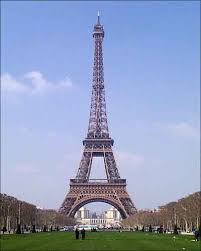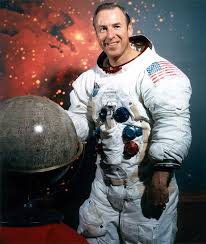Sunday, 31 March 2013
The Eiffel Tower
The Eiffel Tower is one of the most famous monuments in the world (324 meters, 10,100 tonnes) it opens on 31 March 1889, it is dedicated in Paris in a ceremony presided over by Gustave Eiffel, the tower's designer, and attended by French
Prime Minister Pierre Tirard, a handful of other dignitaries, and 200
construction workers.It was built for the World Fair, where it was the star attraction.

Saturday, 30 March 2013
Invention of the phototransistor was announce
 The invention of the phototransistor was announced on March 30,1950 ( Murray Hill NJ). This was a transistor operated by light rather than electric current, invented by Dr. John Northrup Shive of the Bell Telephone Laboratories at Murray Hill, N.J. It used a tiny chip of germanium, a semiconductor material, but only a single collector wire. The tip of this wire rests in a small dimple ground into one side of the germanium disk. At this point the germanium disk is only three thousandths of an inch thick. Light focussed on the opposite, un-dimpled side of the disk can control the flow of current in the wire, thus making a control device similar in function to a photo-electric cell.
The invention of the phototransistor was announced on March 30,1950 ( Murray Hill NJ). This was a transistor operated by light rather than electric current, invented by Dr. John Northrup Shive of the Bell Telephone Laboratories at Murray Hill, N.J. It used a tiny chip of germanium, a semiconductor material, but only a single collector wire. The tip of this wire rests in a small dimple ground into one side of the germanium disk. At this point the germanium disk is only three thousandths of an inch thick. Light focussed on the opposite, un-dimpled side of the disk can control the flow of current in the wire, thus making a control device similar in function to a photo-electric cell.Friday, 29 March 2013
The first spacecraft to reach the planet Mercury
Thursday, 28 March 2013
The first seaplane
The first seaplane took off from water at Martinques, France. The pilot was Henri Fabre. The first autonomous flight by a hydroplane was made by the French engineer Henri Fabre on March 28, 1910. A seaplane is a powered fixed-wing aircraft capable of taking off and landing (alighting) on water. Seaplanes that can also take off and land on airfields are a subclass called amphibian aircraft.

Wednesday, 27 March 2013
Wilhelm Rontgen
Wilhelm Conrad Röntgen was a German physicist, who Discovered X-rays or Rontgen rays (detected electromagnetic radiation in a wavelength range) on 8 November 1895, He was born on March 27, 1845. In honour of his accomplishments, the IUPAC named element 111, Roentgenium, a very radioactive element with multiple unstable isotopes. He died on
10 February 1923.

World Theatre Day
Tuesday, 26 March 2013
The first person to visit Challenger Deep
Canadian Film maker, James Cameron, becomes the first person to visit
Challenger Deep( The Challenger Deep is the deepest known point in the Earth,s sea floor hydrosphere, with a depth of 10,898 m (35,755 ft ) to 10,916 m (35,814 ft) by direct measurement from submersibles, and slightly more by sonar), the deepest point on Earth in over 50 years on March 26,2012.


Monday, 25 March 2013
Jim Lovell
James "Jim" Arthur Lovell, Jr. was born on March 25, 1928 and he is a former NASA astronaut and a retired captain in the US Navy , most famous as the commander of the Apollo 13 mission, which suffered a critical failure en route to the Moon but was brought back safely to Earth by the efforts of the crew and mission control. He is one of only 24 people to have flown to the Moon, the first of only three people to fly to the Moon twice, and the only one to have flown there twice without making a Landing . Lovell was also the first person to fly in space four times.

Sunday, 24 March 2013
World Tuberculosis Day
World Tuberculosis Day, falling on March 24 each year, is designed to build public awareness about the global epidemic of tuberculosis and efforts to eliminate the disease. March 24 commemorates the day in 1882 when Dr Robert Koch astounded the scientific community by announcing that he had discovered the cause of tuberculosis, the TB bacillus.

Saturday, 23 March 2013
World Meteorological Day
World Meteorological Day (WMD) is observed on 23rd March every year. It will be celebrated to commemorate the
coming into force on 23rd March 1950 of the convention establishing the
World Meteorological Organization (WMO).
 The theme for this year(2013) is "Watching the weather to protect life and property-Celebrating 50 Years of World Weather Watch".
The theme for this year(2013) is "Watching the weather to protect life and property-Celebrating 50 Years of World Weather Watch".

Friday, 22 March 2013
Thursday, 21 March 2013
International Day for the Elimination of Racial Discrimination
World Forestry Day
Every year, 21 March is distinguished as World Forestry Day. The concept of having a World Forestry Day originated at the 23rd
General Assembly of the European Confederation of Agriculture in 1971.


Wednesday, 20 March 2013
Isaac Newton's death anniversary
Sir Isaac Newton was an English physicist and mathematician who
is widely regarded as one of the most influential scientists of all time
and as a key figure in the scientific revolution. Born on December 25, 1642 and died on March 20, 1727.


Tuesday, 19 March 2013
Fidel Castro step down
The Cuban leader on 19th March, 2008, forty-nine years after taking
power in an armed revolution. This has
ended the Cold War fracas that has made him an icon to leftists, and a tyrant
to his foes. Castro, 81, who has not appeared in
public since undergoing stomach surgery, said he would not be seeking a new
term as president or leader of Cuba's armed
forces when the National Assembly meets again. His retirement has raised expectations
for a post-communist system of
government, and calls by the United States for democracy.

Monday, 18 March 2013
Rudolf Diesel
Rudolf Christian Karl Diesel was a German inventor and mechanical engineer, famous for the invention of the Diesel engine. Born on March 18, 1858 and died September 29, 1913.In 1898, Rudolf Diesel was granted patent #608,845 for an "internal combustion engine" the Diesel engine.

Sunday, 17 March 2013
Gottlieb Daimler
Saturday, 16 March 2013
First cricketer to score 100 international centuries
Indian batsman Sachin Tendulkar became the first
player to score 100th international hundred on 16 March 2012, at Mirpur against Bangladesh in the Asia Cup.


Friday, 15 March 2013
world consumer rights day
On 15 March 1962, President John F Kennedy gave an address to
the US congress in which he formally addressed the issue of
consumer rights. He was the first world leader to do so, and the
consumer movement now marks 15 March every year as a means of
raising global awareness about consumer rights.

Thursday, 14 March 2013
Albert Einstein

Subscribe to:
Comments (Atom)

